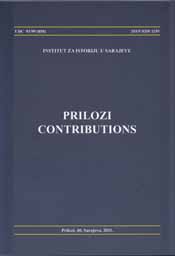The Human Concept in fin-de-siècle Bosnia and Herzegovina. A comparison between Ljudevit Dvorniković and Neo-scholastics
The Human Concept in fin-de-siècle Bosnia and Herzegovina. A comparison between Ljudevit Dvorniković and Neo-scholastics
Author(s): Mitsutoshi InabaSubject(s): History
Published by: Institut za istoriju
Keywords: Human being; Individuality; Biology; Esthetics; Historiography; Metaphysics; Pedagogy; Psychology; Neo-Scholastics; Ljudevit Dvorniković; and Josip Stadler
Summary/Abstract: My aim is to investigate one source of our essentialism in the concept of human being at the turn of the century. As its concrete theme, I have chosen the conflict between Darwinism and the neo-scholastics. In particular, I analyze the relationship between Ljudevit Dvorniković and Josip Stadler, because the former endeavored to occupy his place in opposition to the neo-scholastics. Dvorniković regards our human history as a continuous differentiation. On the other hand, the neo-scholastics, especially Stadler regard the history as the growth within each genus. Although Dvorniković historically approached the human being, his metaphysical presupposition prevented him from historicizing the human being totally. His metaphysical presupposition is the notion that the human being as one growing species exists. At this point, he unintentionally has some relationship with his potential enemy, the neo-scholastics. I think one source for the essentialism is such a strange coexistence of the differentiating human being and invariable, although growing, human being.
Journal: Prilozi
- Issue Year: 2011
- Issue No: 40
- Page Range: 97-133
- Page Count: 37
- Language: English

